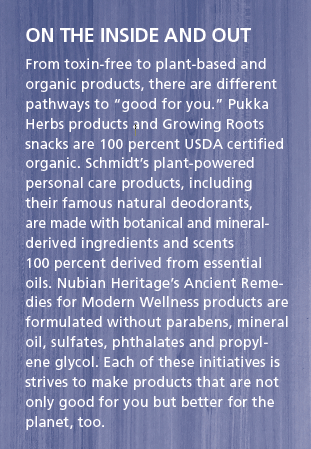May 1, 2019

Sponsored Content
What does it mean to be healthy? To meet consumer needs, brands need to understand what today’s shoppers want and need, as well as the challenges they face. Only then can companies truly understand their role in spreading more health to more people. “Good for you” is about being mindful of what we put in our bodies and what we put on our bodies. It’s about nourishing our bodies and a commitment to good nutrition, but it’s also about saying no to toxins on our skin or in our houses. It’s about self-esteem, along with physical and mental health. It’s about overall well-being, feeling good about ourselves and feeling safe at home or at work.
The shift to healthier habits usually begins with how we nourish ourselves. With a 24 percent increase in veganism from 2017 to 2018 and a focus on plant-based products and ketogenic and paleo diets, consumers are seeking healthier options and products with clean ingredient profiles. Even so, the rise of diabetes, obesity and other chronic illnesses indicates declining soil nutrients and diets full of processed foods. According to the Centers for Disease Control, a majority of Americans do not get enough daily nutrients, leading to a society that has been dubbed well-fed but undernourished. So how can we better steward the planet and our own health? Changing the lens we look through is a start.
“Once you are in the food sector, good for the planet and good for the consumer are very close to the same thing,” says Andy Heintzman, president of InvestEco, an environmental investment company, and the author of The New Entrepreneurs: Building a Green Economy for the Future (House of Anansi, 2010). He offers the example of grass-fed, organic dairy. “If the cow is raised well and produces a healthier product, it supports the health of people, and raising a cow properly is supporting the environment, small family farms and healthy agricultural communities.”
This type of system is what is needed to support human sustainability, says Sheldon Romer, executive consultant and co-founder/former CEO of Rudi’s Organic Bakery. “What are the conditions that need to happen for humanity to not just be sustainable, but to thrive?” he asks. A focus on health and wellness, environment and community, social values, food systems and brand trust all have to do with making and giving people an opportunity to be more sustainable, Romer says. Yet, he says, people have to feel cared for or care about themselves to truly move the needle on sustainability. “How are people going to care about the environment if they don’t care about themselves? It’s a disconnect. If they don’t care about themselves, they are not going to support getting plastic out of the ocean,” he adds. “There is an absolute push that we need to take care of ourselves as human beings. We need to set up our society to care for each other in a different way.”
 This is where companies come in. In a 2016 study conducted by Harvard’s Institute of Politics, researchers found that a majority of millennials reject capitalism. The study showed that of young adults ages 18 to 29, 42 percent support capitalism. “They don’t reject the system of capitalism, but they reject how it currently is working. What it is currently doing is just creating shareholder wealth,” Romer says. He notes that this raises a range of questions, from “How do we create wealth for the nonsharedholder stakeholders?” to “How do companies take care of their employees and communities in a much deeper way?” For the conscious companies redefining the future of business, digging deep and tackling these issues will be the key to building trust—the right way.
This is where companies come in. In a 2016 study conducted by Harvard’s Institute of Politics, researchers found that a majority of millennials reject capitalism. The study showed that of young adults ages 18 to 29, 42 percent support capitalism. “They don’t reject the system of capitalism, but they reject how it currently is working. What it is currently doing is just creating shareholder wealth,” Romer says. He notes that this raises a range of questions, from “How do we create wealth for the nonsharedholder stakeholders?” to “How do companies take care of their employees and communities in a much deeper way?” For the conscious companies redefining the future of business, digging deep and tackling these issues will be the key to building trust—the right way.
You May Also Like
.png?width=700&auto=webp&quality=80&disable=upscale)


